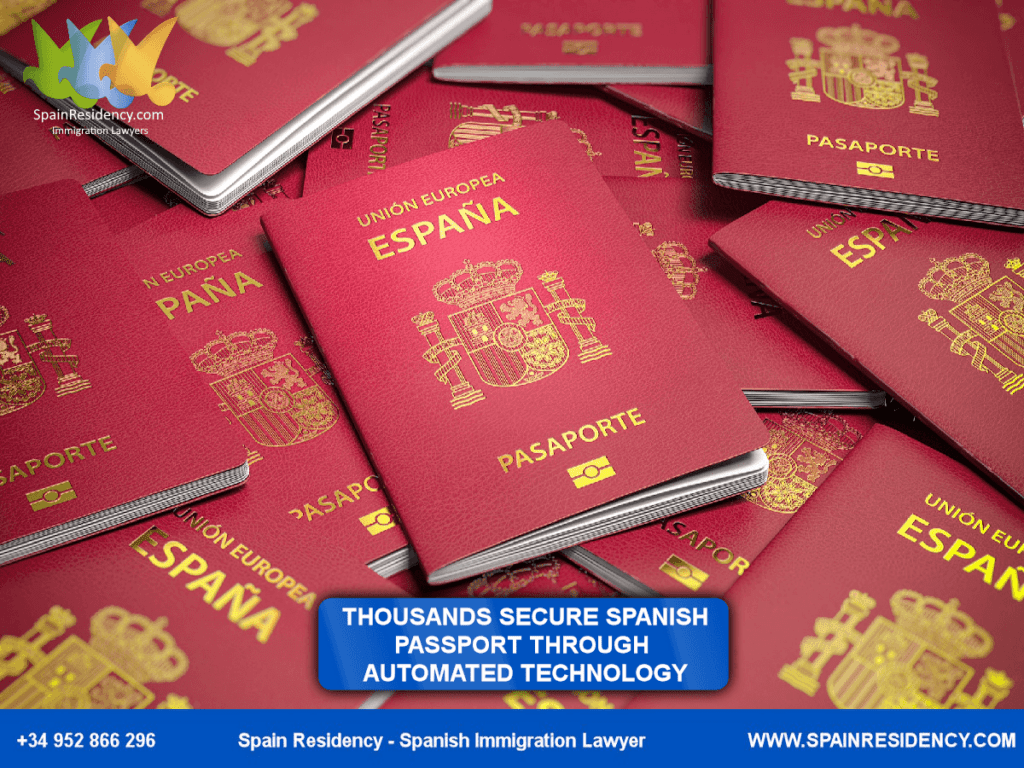Thousands secure spanish citizenship through automated technology easing a longstanding backlog in Spain.
Menu:
In this post we cover the following: (click any section to see its content)
Thousands secure spanish citizenship through automated technology easing a longstanding backlog in Spain:
THOUSANDS SECURE SPANISH CITIZENSHIP:
Changing years of uncertainty, to being able to receive approval within mere months has become a reality for many. In 2023, a significant milestone was achieved as 243,481 individuals secured Spanish citizenship through residency—the highest figure recorded since 2013. This surge seems to herald the decline of the chronic backlog that has long afflicted foreign nationals navigating the final stage of their migratory odyssey.
The catalyst for this dramatic acceleration lies in the adoption of advanced robotic process automation technology for application reviews. This innovation has enabled applicants, who once endured years of anticipation, to now receive decisions within a few short months.
Such a substantial number of citizenship aprovals hasn’t been seen since 2013, when 261,295 approvals were recorded. In the interim, peaks occurred in 2019 and 2021, largely due to temporary intervention measures by the Justice Department aimed at expediting approvals, primarily through personnel augmentation.
The secret is in the robotization of multiple robots which now meticulously verify the documents that confirm an applicant’s compliance with essential criteria, such as the duration of residency in Spain (which varies based on individual cases), successful completion of language and integration tests, and a clean criminal record devoid of negative police reports.
This technological advancement has notably accelerated the decision-making process. Unlike human workers, robots do not tire. Moreover, they are exceedingly precise and meticulous, reducing the likelihood of human errors that previously occurred—such as misentering names during data verification—and also serve as a safeguard against fraud.
Data from the Permanent Immigration Observatory of the Ministry of Inclusion, Social Security, and Migration reveals that the predominant demographic obtaining citizenship in 2023 consisted of women aged 35 to 49 years. The most common countries of origin were Morocco (45,799), Venezuela (36,409), and Colombia (20,380).
A considerable majority of those who attained citizenship by residency (130,128) originated from Ibero-American nations, as well as from Andorra, the Philippines, Equatorial Guinea, Portugal, or the Sephardic community, for whom the required residency duration is two years.
STABILITY AND SERENITY:
At 65, Venezuelan Lladitza Alvarado had nearly abandoned hope after waiting almost two years since submitting her citizenship application. “I thought they wouldn’t grant it to me—due to my age and because I only earned 800 euros working as a caregiver. I figured, ‘I don’t contribute much to the State; they might see me as a burden,'” she reflects. Yet, in 2023, she finally received the coveted ‘yes.’ “I feel more stable and incredibly joyful to be a part of Spain,” she shared. Furthermore, as a full-fledged Spanish citizen, she was at last able to travel to Miami in December to reunite with her granddaughter, whom she hadn’t seen in nearly a decade.
“Stability” and “serenity” are also the sentiments echoed by her fellow Venezuelan, Gerson Alexandrick Mejías. After arriving in Spain in 2017 and securing asylum on humanitarian grounds, he was elated last month when his citizenship was confirmed, following a brief five-month wait. “I feel a greater sense of peace, which is what I was seeking,” says the 32-year-old in an interview, celebrating the fact that he no longer needs to renew his documentation annually.
Specialized immigration law firms, such as SpainResidency, have observed a marked shift in the timeline for processing these applications.
CASES OF DECADE-LONG DELAYS:
Previously, it wasn’t uncommon for the process to take three or four years—sometimes even longer. Today, we are generally within the legal timeframe of one year, and many cases are resolved much sooner.
This change has led to stop thousands of appeals that firms would routinely file when the waiting periods became excessively protracted. Nevertheless, we caution against declaring the end of the backlog that has historically plagued the citizenship approval process.
According to the latest figures from the Justice Department, as of June 30, 2024, there were still 203,674 applications pending resolution. While most of these are from recent years, a few have languished in the system for nearly a decade (with 282 cases dating back to 2015).
ALL TYPES OF RESIDENCY AVAILABLE IN SPAIN:
- Golden-Visa Spain (residence in Spain by investment)
- Non-Lucrative visa Spain (Spanish visa non lucrative)
- Self-Employed visa Spain (self employed expats in Spain)
- Digital-Nomad visa Spain (remote worker in Spain)
Please see-here our video-blog with options and legal-advice to obtain residency in Spain.
Remember that immigration procedures and immigration regulations change regularly, so it’s crucial to stay updated with the latest information from reliable sources. If you have specific questions or concerns about your situation, it’s advisable to consult with immigration authorities or legal professionals specializing in immigration matters, to do this, please click-here »
DO YOU REQUIRE ASSISTANCE TO APPLY FOR RESIDENCE OR CITIZENSHIP IN SPAIN?
We are a Spanish Solicitor and assist our clients with all types Spanish legal processes.
Permanent residency is obtained after 5 years of Spanish Residency through Self-Employed Residency, Digital-Nomad, Non-Lucrative Residency or Golden-Visa. This followed by 5 years as a permanent resident in Spain and means you can then obtain Spanish Citizenship with a Spanish Passport.


